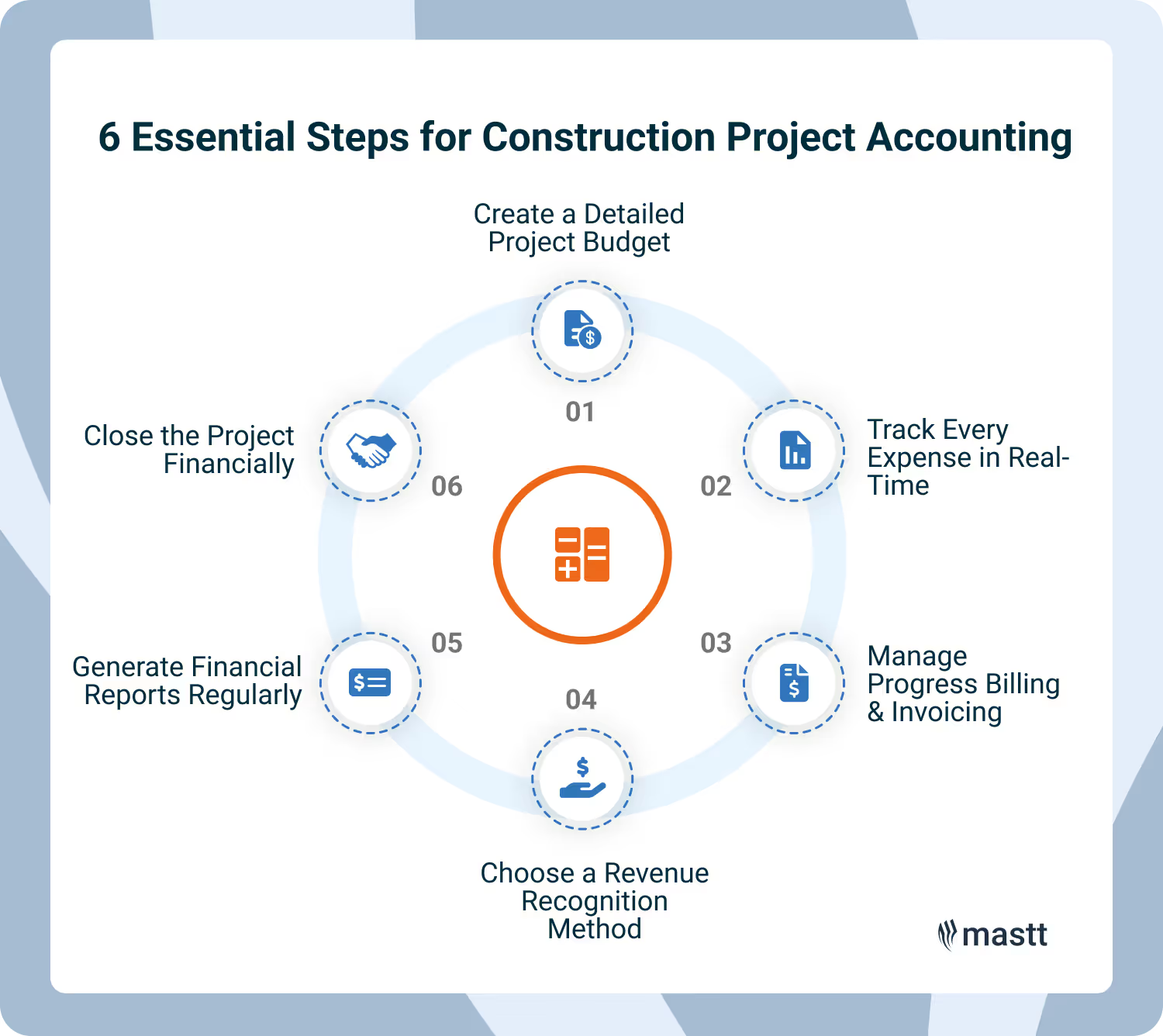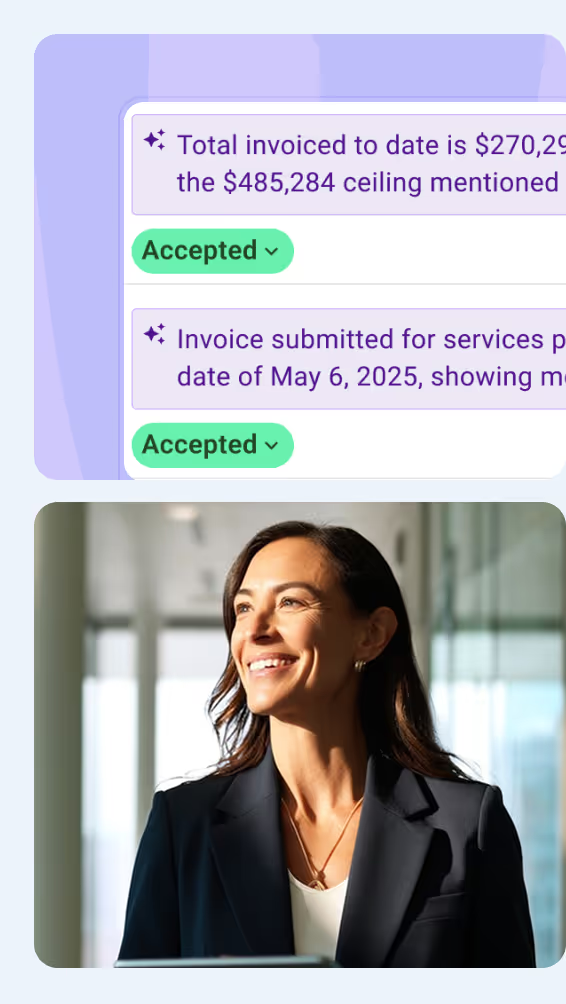Keeping your construction projects profitable starts with understanding construction project accounting. You need to track costs, manage budgets, and control cash flow. Without a solid system, cost overruns and payment delays can hurt your bottom line.
Do you know how to handle job costing, retainage, and financial reporting the right way? If not, I’ll walk you through everything step by step.
What is Construction Project Accounting?
Construction project accounting tracks and manages all financial activities of a construction project, including costs, revenue, budgeting and forecasting, and financial performance. It ensures that expenses stay within budget and that payments are properly recorded, preventing financial mismanagement.
Construction projects involve long timelines, fluctuating costs, and complex payment structures, making specialized accounting essential. Without it, cost overruns, payment disputes, and cash flow problems can harm profitability.
Project Accounting vs. Traditional Accounting
Traditional accounting looks at a company’s overall financial health, while construction project accounting tracks individual project finances separately. Construction projects require:
- Job costing to assign costs to specific tasks or phases.
- Progress billing & retainage for staged payments.
- Revenue recognition methods unique to long-term projects.
These differences help construction companies maintain financial accuracy and compliance across multiple projects.
Why Project Accounting is Essential for Construction Businesses
Construction project accounting is crucial for profitability and financial stability. Without proper tracking, budgets can spiral out of control, payments can be delayed, and unexpected costs can reduce profits.
Key benefits of construction project accounting include:
- Budget control: Ensures spending stays within limits.
- Accurate financial reporting: Tracks project progress and profitability.
- Better cash flow management: Prevents payment delays and revenue loss.
- Regulatory compliance: Meets industry financial reporting standards.
Mastering construction project accounting helps businesses avoid costly mistakes and improve long-term success.
What Are the Key Principles of Construction Cost Accounting?
The key principles of construction cost accounting are job costing, budget control, cost classification, and revenue recognition. These principles help track every project expense and ensure accurate financial reporting.
Construction businesses apply these principles to manage project finances effectively:
- Job Costing & Budget Control: Assigns costs to specific tasks or phases of a project, tracking labor, materials, and overhead to prevent overspending.
- Direct vs. Indirect Costs: Separates costs that are directly related to a project, like materials and subcontractor fees, from indirect costs like office expenses and administrative salaries.
- Revenue Recognition Methods: Defines when a construction company records income. The Completed Contract Method recognizes revenue at project completion, while the Percentage-of-Completion Method records income as work progresses.
Construction projects have unique financial challenges, such as fluctuating costs, payment delays, and multi-stage billing. Understanding these principles prevents financial mismanagement and improves overall profitability.
How to Do Construction Project Accounting Effectively
Construction accounting works by tracking all financial transactions at every project stage to ensure accurate budgeting, project cost management, and financial reporting. To do this effectively, you need a structured approach that covers budgeting, expense tracking, invoicing, revenue recognition, and financial reporting.
To manage construction accounting properly, follow these steps:
1. Create a Detailed Project Budget
Start by setting up a realistic and detailed budget before any work begins. List all expected construction costs, including labor, materials, equipment, and overhead. Break the budget into phases so you can track spending at every stage.
Once the budget is set, use historical data from past projects to refine your estimates. If possible, adjust for price fluctuations in materials and labor to prevent cost overruns. A strong budget is the foundation of effective construction accounting.
Use our construction cost calculator to get accurate estimates and keep your project budget on track.
2. Track Every Expense in Real Time
Once work starts, record every cost as it happens. Track expenses under categories such as labor, materials, equipment, and administrative costs. Use project cost accounting software to automate this process and keep records accurate.
Compare actual costs against the budget regularly. If spending starts exceeding estimates, investigate the cause and adjust the budget or project scope if necessary. Keeping up with real-time expenses prevents financial surprises and helps manage cash flow.
3. Manage Progress Billing and Invoicing
Instead of waiting until the project is completed, bill clients based on completed work at specific milestones. This method, called progress billing, keeps cash flow steady throughout the project.
To manage invoices efficiently, submit them as soon as each phase is completed. Use payment applications and financial documentation to support your invoices, ensuring clients approve them quickly. Delayed payments can disrupt cash flow, so follow up on overdue invoices and enforce payment terms outlined in contracts.
4. Choose the Right Revenue Recognition Method
How and when you recognize revenue affects your company’s financial health. In construction, most businesses choose between two methods:
If you use the Completed Contract Method, revenue is recognized only when the entire project is finished. This method is common for short-term projects or when financial uncertainty is high.
If you use the Percentage-of-Completion Method, revenue is recorded as work progresses. This approach aligns income with expenses and provides steady cash flow for long-term projects. Choose the method that best suits your business model and tax strategy.
5. Generate Financial Reports Regularly
Keeping track of a project’s financial health requires consistent and detailed financial reporting. Work-in-Progress (WIP) reports help track earned revenue and expenses, showing whether the project is financially on track. Job cost reports break down spending, helping you identify where costs are increasing.
Review financial reports regularly to spot problems early. If costs are rising too quickly or cash flow is slowing, adjust the budget, delay non-essential expenses, or renegotiate contracts. Clear financial reporting ensures you make informed decisions before problems grow.
6. Finalize Payments and Close the Project Financially
At project completion, review all financial records to ensure every cost is accounted for and all invoices are paid. Reconcile final payments with outstanding balances and verify that subcontractors and suppliers have received their payments.
Once all accounts are settled, close the project’s financial records and prepare reports for tax filing and compliance. Review final costs compared to the original budget to improve future cost estimating and financial planning.

Best Practices for Construction Project Accounting
The best way to manage construction project accounting is to track costs accurately, manage payments properly, and follow financial regulations. Follow these best practices to ensure accurate reporting, prevent cash flow problems, and minimize financial risks:
- Set up a clear cost tracking system: Record every project expense under job costing categories like labor, materials, and overhead.
- Monitor budgets regularly: Compare actual spending with the budget to catch overspending early.
- Manage retainage and payment schedules: Keep track of withheld payments and ensure subcontractors get paid on time.
- Follow proper revenue recognition methods: Use either the percentage-of-completion method for long-term projects or the completed contract method for short-term jobs.
- Keep all financial records organized: Store invoices, contracts, and expense reports properly for audits and compliance checks.
- Ensure compliance with construction financial regulations: Follow tax laws, labor regulations, and industry-specific accounting standards to avoid penalties.
- Use construction accounting software: Automate invoicing, expense tracking, and reporting to reduce errors and improve efficiency.
A well-managed accounting system helps construction businesses stay profitable, avoid legal issues, and make better financial decisions. Regular financial reviews and detailed cost tracking allow project managers to adjust spending, improve cash flow, and reduce financial risks before they become major problems.
🚀 Pro Tip: Simplify construction accounting with Mastt! Get real-time construction cost tracking, automated reporting, and seamless accounting integration to keep your projects profitable and on budget.
What Are Construction Project Cost Accounting Systems?
Construction project cost accounting systems are tools that track project expenses, manage budgets, and keep financial records accurate. They help construction businesses organize job costs, send invoices, and monitor cash flow efficiently.
These systems reduce manual work, prevent financial mistakes, and provide real-time cost insights. They also integrate with accounting software, making it easier to handle multiple projects and stay compliant with financial regulations.
A cloud-based system like Mastt gives construction teams real-time cost tracking, automated reports, and better budget control. With instant access to financial data, project managers can make faster, smarter decisions and avoid budget overruns.
Common Challenges in Construction Accounting & How to Solve Them
Construction accounting can be difficult due to budget overruns, late payments, tracking costs across multiple projects, and compliance risks. To solve them, construction businesses need better cost tracking, automated invoicing, and clear financial reporting.
The table below highlights specific construction accounting challenges and how to fix them:
To fix these issues completely, construction businesses need reliable financial tracking, clear payment systems, and accurate cost reporting. Cloud-based solutions like Mastt simplify this by automating reports, tracking real-time costs, and improving cash flow management.
Reports & Financial Documents Used in Construction Accounting
Construction accounting relies on detailed reports and financial documents to track expenses, manage payments, and keep projects on budget. These records help project managers and accountants monitor costs, avoid financial mistakes, and make informed decisions.
Here are the essential reports and financial documents you need:
- Work-in-Progress (WIP) Reports: Track ongoing costs, earned revenue, and project completion percentage to prevent budget overruns.
- Job Cost Reports: Break down labor, materials, equipment, and subcontractor expenses to help control spending.
- Change Order Logs: Record any approved changes to the project scope and cost with a change order template to ensure accurate financial adjustments.
- Invoice Registers: Keep track of all sent and received invoices to monitor payments and avoid cash flow issues.
- Profit and Loss Statements: Show total revenue, expenses, and net profit for each project to measure financial success.
- Balance Sheets: List project assets and liabilities to provide a clear view of overall financial stability.
Regularly reviewing these reports helps identify overspending, cash flow gaps, or missing payments before they become major issues. Automating reports with construction project management software like Mastt makes it easier to access real-time financial data, saving time and reducing errors.
Keep Your Construction Project Accounting Under Control
Good construction project accounting means keeping track of every cost and payment. Using the right tools and systems helps reduce mistakes, stay on budget, and keep cash flow steady.
When financial records are clear and organized, project managers can make better decisions, avoid risks, and keep projects moving without delays.












![14 Proven Ways to Reduce Construction Costs [Free Checklist]](https://cdn.prod.website-files.com/607f739c92f9cf647516b37b/67e1f607e284e7835370f1d5_ways-to-reduce-construction-costs.avif)
![14 Proven Ways to Reduce Construction Costs [Free Checklist]](https://cdn.prod.website-files.com/607f739c92f9cf647516b37b/61b7e99d10d746762895ef70_Mastt_headshots_%20(98).avif)


